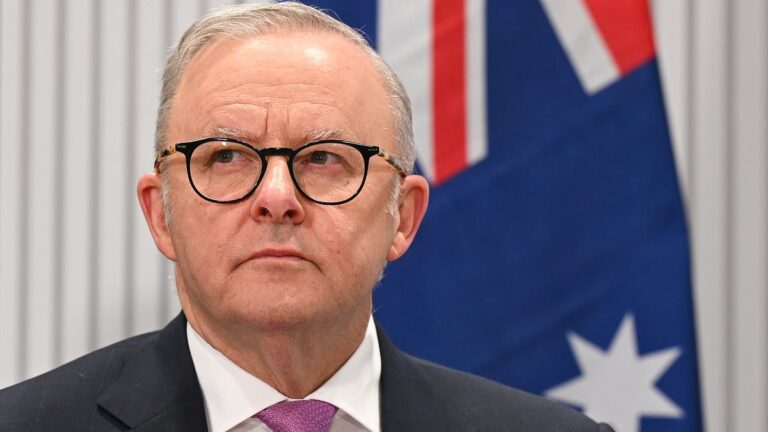Former Prime Minister Scott Morrison has slammed Anthony Albanese for failing to speak publicly for almost 24 hours on the US strike on Iranian nuclear facilities.
The former Liberal leader said Australia’s allies ‘need to know where it stands’ after US President Donald Trump unleashed a fleet of B-2 bombers to ‘obliterate’ three Iranian nuclear enrichment sites on Sunday.
‘We’ve heard from (UK Prime Minister) Keir Starmer, we’ve heard from (French President) Emmanuel Macron, we’ve heard from many,’ Morrison told 2GB.
‘I think it’s very important that Australia makes it very clear where we stand.
‘I think on the Middle East issue more broadly, particularly going back to October 7th, there’s been an absolute fog of ambiguity when it comes to where the government stands on this issue, and in this case, particularly with our strongest ally.
‘Now I think this has been a courageous action by President Trump.’
The Prime Minister told 2GB host Ben Fordham that he would speak after the National Security Cabinet (NSC) convened a meeting on Monday morning.
But Morrison insisted that an NSC meeting could have taken place on Sunday and that Albanese should have spoken on the 6pm news last night.
‘Clarity requires timeliness, and so I look forward to a positive statement from the Prime Minister and the government and an acknowledgement of the right actions which have been taken by the US President,’ Morrison added.

Former Prime Minister Scott Morrison has slammed Anthony Albanese for failing to speak publicly for almost 24 hours on the US strike on Iranian nuclear facilities (pictured: Jenny Morrison, Melania Trump, Donald Trump and Scott Morrison)

The Prime Minister told 2GB host Ben Fordham that he would speak after the National Security Cabinet (NSC) convened a meeting on Monday morning
One 2GB listener quipped that Albanese had been silent because he was ‘just using his right to disconnect’.
The right to disconnect law, which took effect last year, allows employees to refuse work-related contact outside of their working hours.
It comes after the Albanese government shifted its tone on the US strikes on Monday morning.
On Sunday, a government spokesperson offered no endorsement of the US decision to target Iranian nuclear facilities, instead calling ‘de-escalation, dialogue, and diplomacy’.
But after the Coalition offered its full support for the ‘proactive action’, Foreign Minister Penny Wong came out in support of Trump’s military intervention.
‘The world has agreed Iran cannot be allowed to get a nuclear weapon. So yes, we support action to prevent that. And that is what this is,’ Senator Wong told ABC’s News Breakfast.
‘The big question is, now what? And Australia says, like so many other countries, we do not want escalation and a full-scale war and we continue to call for dialogue and diplomacy.’
When asked about the legality of the strikes, Senator Wong said: ‘I think we are all clear that Iran… cannot be allowed to get a nuclear weapon. So yes, the government does support action to prevent that.’

Following crisis talks with UK Prime Minister Keir Starmer on Sunday, Trump took to social media claim that the current Islamic regime ‘is unable to MAKE IRAN GREAT AGAIN’ (pictured: Trump arriving to deliver an address to the nation following US strikes on Iran’s nuclear facilities)
Following crisis talks with UK Prime Minister Keir Starmer on Sunday, Trump took to social media claim that the current Islamic regime ‘is unable to MAKE IRAN GREAT AGAIN’.
‘Why wouldn’t there be a regime change,’ Trump asked, rhetorically – even as he and Starmer urged Ayatollah Khameini to ‘return to the negotiating table as soon as possible’.
Israel’s Prime Minister Benjamin Netanyahu said his country was close to achieving its goals of destroying Iran’s nuclear program.
‘We won’t pursue our actions beyond what is needed to achieve them, but we also won’t finish too soon,’ Netanyahu said on Monday.
‘When the objectives are achieved, then the operation is complete and the fighting will stop,’
Following an emergency session of the UN Security Council, Secretary-General António Guterres warned that the conflict risks ‘descending into a rathole of retaliation’.
‘W e now risk descending into a rathole of retaliation after retaliation,’ he said.
‘To avoid it, diplomacy must prevail, civilians must be protected, safe maritime navigation must be guaranteed.’

